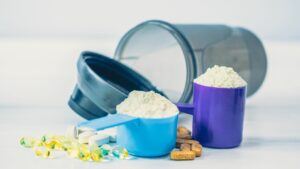Sports Medicine Nutrition
- Importance of Nutrition: Sports medicine nutrition is critical for enhancing athletic performance, recovery, and injury prevention by optimizing dietary choices tailored to individual needs.
- Key Macronutrients: Athletes should focus on a balanced intake of carbohydrates for energy, proteins for muscle repair, and healthy fats for overall health and hormonal balance.

- Essential Micronutrients: Vitamins and minerals play vital roles in energy production and immune function; a varied diet rich in fruits, vegetables, lean proteins, and whole grains is essential for meeting these needs.
- Hydration Strategies: Maintaining proper hydration is crucial for peak performance; athletes should establish fluid intake routines and monitor hydration levels, especially during intense training or competitions.
- Meal Timing for Recovery: Consuming a balanced meal within 30 minutes post-exercise can significantly enhance muscle recovery and maximize nutrient utilization.
- Personalized Nutrition Plans: Individualized nutrition strategies based on activity level, goals, and preferences are key to optimizing health and athletic performance.
In the world of athletics, the right nutrition can be a game-changer. Sports medicine nutrition focuses on optimizing dietary choices to enhance performance, speed recovery, and prevent injuries. Athletes need more than just calories; they require a balanced intake of macronutrients and micronutrients tailored to their specific needs.
Understanding the science behind sports nutrition helps athletes unlock their full potential. From hydration strategies to meal timing, every detail matters. By integrating effective nutritional practices, athletes can not only improve their performance but also maintain overall health. This article delves into the essential principles of sports medicine nutrition and how it plays a crucial role in an athlete’s success.
Overview of Sports Medicine Nutrition
Sports medicine nutrition involves tailored dietary strategies aimed at optimizing athletic performance, enhancing recovery, and preventing injuries. Athletes require specific macronutrient and micronutrient ratios to support their unique physical demands.
Macronutrients
- Carbohydrates – Carbs provide essential energy for workouts and competitions. Athletes should focus on complex carbohydrates, such as whole grains, fruits, and vegetables.
- Proteins – Proteins support muscle repair and recovery. Athletes benefit from lean protein sources including poultry, fish, beans, and legumes.
- Fats – Healthy fats, like those found in avocados and nuts, contribute to hormonal balance and energy reserves. Incorporating unsaturated fats is crucial for sustained performance.
Micronutrients
- Vitamins – Essential vitamins, like vitamin D and B vitamins, play significant roles in energy production and immune function. Diverse diets rich in fruits and vegetables ensure adequate vitamin intake.
- Minerals – Key minerals, such as calcium and iron, support bone health and oxygen transport, respectively. Dairy products, leafy greens, and lean meats provide important mineral sources.
Hydration
Hydration strategies significantly impact athletic performance. Maintaining fluid balance prevents dehydration-related fatigue and enhances overall function. Athletes should regularly monitor fluid intake before, during, and after physical activities.
Meal Timing
Meal timing influences energy levels and recovery. Consuming a balanced meal containing carbohydrates and proteins within 30 minutes post-exercise aids in muscle recovery. Planning meals around training sessions maximizes nutrient utilization.
- Balanced Diet – A well-rounded diet supports optimal performance and overall health.
- Personalization – Nutritional needs vary among athletes, necessitating individualized plans based on activity level, goals, and preferences.
- Continuous Education – Staying informed about the latest research in sports nutrition ensures athletes make effective dietary choices.
Sports medicine nutrition encompasses a multifaceted approach that fosters athletic excellence and enhances well-being through informed dietary practices.
Key Nutrients for Athletes
Athletes require a careful balance of nutrients to optimize performance and recovery. Key nutrients include macronutrients—carbohydrates, proteins, and fats—as well as essential micronutrients.
Macronutrients
- Carbohydrates: Carbohydrates serve as the primary energy source for athletes. They provide quick energy during intense exercise. Complex carbohydrates, like whole grains and legumes, sustain energy levels for prolonged activities. Aim for 6-10 grams of carbohydrates per kilogram of body weight daily, depending on activity intensity.
- Proteins: Proteins are crucial for muscle repair and growth. They help recover from training sessions and maintain lean muscle mass. Athletes should consume 1.2-2.0 grams of protein per kilogram of body weight, focusing on high-quality sources like lean meats, dairy, and plant-based proteins.
- Fats: Healthy fats support hormonal balance and energy needs during longer-duration exercises. Sources include avocados, nuts, seeds, and olive oil. Athletes should derive 20-35% of total daily calories from fats, emphasizing unsaturated fats for optimal health.
- Vitamins: Vitamins play key roles in energy production, immune function, and muscle contraction. B vitamins aid in energy metabolism, while vitamin D supports bone health. Athletes should focus on a variety of fruits and vegetables to attain adequate vitamin levels.
- Minerals: Minerals like calcium, magnesium, and iron are vital for muscle function and overall health. Calcium supports bone density, magnesium aids in energy production, and iron is essential for oxygen transport in the bloodstream. Athletes should monitor mineral intake through dairy products, leafy greens, and lean meats to meet their specific needs.
Understanding both macronutrient and micronutrient requirements allows athletes to tailor their diets for enhanced performance and efficient recovery.
Hydration in Sports Performance
Hydration significantly impacts athletic performance, affecting endurance, strength, and recovery. Proper fluid balance minimizes fatigue and helps maintain optimal physiological function during exercise.
Importance of Staying Hydrated
Staying hydrated supports numerous bodily functions critical for athletes. Dehydration reduces blood volume, impairing cardiovascular function and leading to decreased endurance. It also heightens the risk of heat-related illnesses, negatively affecting mental clarity and reaction times. Maintaining hydration improves muscle function, enhances energy levels, and aids in nutrient transport within the body.
Hydration Strategies for Athletes
Effective hydration strategies are essential for athletes. Consider these practices:
- Establish a Fluid Intake Routine: Drink water consistently throughout the day, not solely during workouts.
- Monitor Hydration Levels: Use indicators like urine color to assess hydration status; pale yellow suggests proper hydration.
- Utilize Electrolyte Drinks: Incorporate sports drinks during prolonged activities to replenish lost electrolytes, especially sodium and potassium.
- Adjust for Environmental Factors: Increase fluid intake in hot, humid conditions to compensate for higher sweat loss.
- Prehydrate Before Events: Consume fluids adequately before competitions to enhance performance and endurance.
- Rehydrate Post-Exercise: Drink fluids after workouts to restore fluid balance and support recovery.
Implementing these strategies contributes to optimal performance and overall health in athletes.
Nutrition Strategies for Injury Recovery
Nutrition strategies significantly impact recovery processes for athletes sustaining injuries. Proper dietary choices expedite healing and restore functionality, ultimately enhancing return-to-play timelines.
Role of Nutrition in Healing
Nutrition plays a pivotal role in injury recovery, influencing tissue repair, reducing inflammation, and supporting immune function. Specific macronutrients contribute to the healing process:
- Proteins: Essential for muscle repair and rebuilding tissues, athletes require a protein intake of 1.2-2.0 grams per kilogram of body weight.
- Carbohydrates: Adequate carbohydrate consumption, approximately 6-10 grams per kilogram, provides necessary energy for recovery, particularly following strenuous rehabilitation exercises.
- Healthy Fats: Incorporating healthy fats supports inflammation management and hormonal balance, fostering an optimal healing environment.
Micronutrients also play a critical role in recovery. Vitamins C and D, zinc, and magnesium are vital for collagen synthesis, immune health, and muscle function. A balanced diet that includes a variety of fruits, vegetables, lean proteins, whole grains, and healthy fats enhances recovery by supplying essential nutrients that facilitate healing processes.
Supplements for Recovery
Certain supplements can augment dietary intake during recovery phases. While whole foods should remain the primary source of nutrition, specific supplements can offer targeted benefits:
- Omega-3 Fatty Acids: Known for their anti-inflammatory properties, omega-3 supplements from fish oil can aid in reducing muscle soreness and joint swelling.

- Vitamin D: This vitamin supports bone health and immune function. Supplementation may be beneficial, especially in athletes with insufficient sun exposure.
- Glutamine: Often used to improve muscle recovery, glutamine supplementation may enhance immune function and muscle repair post-injury.
- Creatine: Used to promote muscle strength and recovery, creatine may assist in enhancing recovery timelines when taken appropriately.
Incorporating these supplements following professional advice can optimize recovery and ensure that athletes return to peak performance.
Performance and Overall Health
Sports medicine nutrition is a cornerstone of athletic performance and overall health. By prioritizing a well-rounded diet tailored to individual needs athletes can significantly enhance their performance and recovery. Understanding the balance of macronutrients and the importance of hydration ensures that athletes are equipped to face the demands of their sport.
Injury recovery also benefits from informed nutritional choices. Adopting effective strategies and staying updated on the latest research empowers athletes to make better decisions. Ultimately a commitment to sports medicine nutrition paves the way for sustained success and longevity in athletics.



